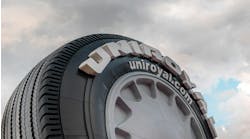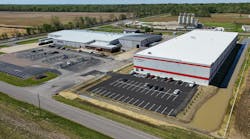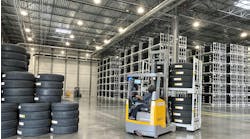By 2015 Cooper Tire & Rubber Co. hopes to know how it will replace the truck and bus tires currently made at the Chengshan (Shandong) Tire Co. Ltd. (CCT) plant in China. Last week Cooper announced it finalized the sale of its share of the plant, though production of Cooper-branded tires will continue there through mid-2018.
“We’ve been working on this for several months,” said Cooper Chairman, CEO and President Roy Armes during a phone call to investors Dec. 4. “We’ve already got a headstart on this thing. Ideally in 2015 we ought to have some idea of what direction we’re going.”
Armes reiterated options he’s outlined previously. Cooper could enter into an agreement with another Chinese supplier, strike up a joint venture, acquire another company, add capacity to its wholly-owned Cooper Kunshan Tire (CKT) plant, buy and manage an existing facility, or build a new factory. With the $262 million in proceeds from the sale of CCT, Armes said all of those options are available.
Closing the sale of CCT now is somewhat “opportunistic,” said Brad Hughes, Cooper’s new president of international operations.
“The landscape of the tire industry globally is changing right now. We will be taking into account all of the factors,” Hughes said, including the U.S. Department of Commerce’s (DOC) decision to impose additional tariffs on consumer tire imports from China, and the chance tariffs someday are extended to other types of tires.
“We have an opportunity as we’re making our investments going forward to consider those things, and frankly we wouldn’t have had that if we were still involved in the CCT joint venture,” Hughes said.
As of now, all options are open, Armes said. Finding a replacement source for TBR tires quickly is the ultimate goal. But it might be that building a plant, which takes the most time, provides the best payback, he said.
“We don’t want this thing hanging around forever,” Armes said.
The DOC issued a 12.5% tariff on Cooper, the lowest of any tire maker. Hughes attributed that lower amount to its cost differential in purchasing carbon black in the region, where it’s less expensive. The tariff will be leveraged on approximately 3-4 million tires a year, which Hughes said is not a large portion of the company’s production.
Separately, Armes dismissed the idea that the CCT sale could lead to the reopening of merger talks with Apollo Tyres Ltd. The two companies had signed an agreement in 2013, but Cooper pulled out of the deal in December 2013.



